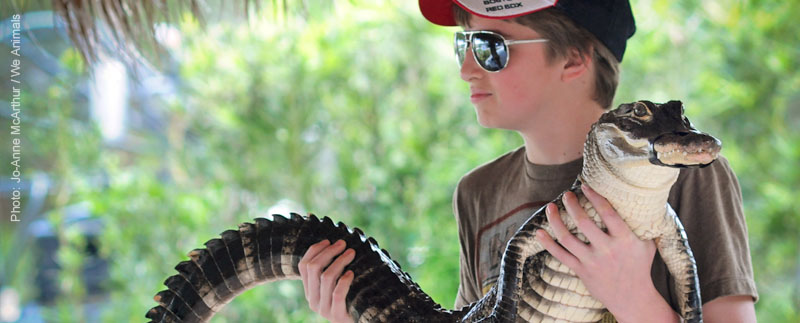Build Back Better for Animals – Defining your commitment

Year 2020 has been a truly devastating year for the travel and tourism sector, and some may say that it is a completely inappropriate time to encourage business to become more responsible and to better protect animals.
…
However, this pandemic has demonstrated the outcome of overexploitation of natural resources for economic gain, and the deadly consequences of ignoring expert warnings. Whereby the exploitation of nature, its wildlife, and its limited resources, results in biodiversity loss, climate change, and greater potential of viral emergence. During tourism sector resurgence, there is perhaps no greater need to review and reduce our negative impact to ensure our future resilience.
This is also the view of Prue Stone, Head of Sustainability at the UK-based adventure tour specialist, Explore. As with most travel businesses, 2020 has been incredibly challenging but, despite restricted working hours, company management has fully supported her decision to work with ANIMONDIAL, and others, to create Explore’s animal protection commitment.
In the hope that Prue’s experiences can inspire and guide other travel businesses to create their own business’ commitment to better protect animals – I have asked Prue to share her thoughts:
“Developing Explore’s animal protection commitment was both a necessity and a luxury. The need for change is very real, and the time for change is now. However, in such a challenging time, and noting that it takes time to create a suitable policy, and possibly money involved, it is also a luxury. A balance needs to be found.”
ANIMONDIAL advocates the importance for each business to create their own animal protection policy within their wider sustainability commitment. Ever since I started work with the Federation of Tour Operators in 2004, creating animal protection guidance for travel businesses (that formed the groundwork for ABTA’s Animal Welfare Guidelines), I have advised businesses to create their own unique commitment as the first important step. Defining their next steps.
“I think the process of creating a policy from scratch, or even reviewing an existing one, can become a point of reflection, or internal audit. We all assume we are “doing the right thing”, but when was the last time we actively checked? By writing down clear guidelines, providing explanations and examples, and communicating them clearly through the business and supply chain, you are ensuring transparency and greater understanding. Ultimately it will allow us to move towards a better future for animals and wildlife and encourage others to do the same.”
Knowing where to start, and what to include in your policy is a challenge. Particularly with so many issues, external pressures, and the multitude of animal species and activities available – whilst also seeking to protect local livelihoods – How do you start drafting such a policy?
“I started by reading other companies’ policies, in a variety of industries, thinking about how each of these made me feel. I wanted to create something that felt authentic to Explore, which encapsulates how we operate and what we believe in. But there are so many issues to consider, and no one policy will ever be perfect. I take comfort from this. I didn’t need to create a policy that could be scribed in stone, I needed to create one that was right for us now, and acknowledge that it will change over time. And indeed, the changes that we need to make also take time.”
Unfortunately, it is never the case of one approach fits all, and your animal protection commitment should reflect your companies’ brand values and operations, but are there key principles to include that you would recommend to other travel businesses?
“The most important components of any policy are commitment and support, more so than the finer detail. Commitment from the person or team writing the policy, those that make the operational changes as a result, those communicating the policy and those ultimately adhering to the guidelines on the ground. There also has to be support from the top level of management, to allow for the time this process can take and how it will filter through the business’ operations.”
Tour operators are regularly under pressure by well-intentioned activists to remove certain practices with animals or modify operations. How do you manage these pressures around your commercial obligations, or have you just removed the ‘unacceptable’ activities all together?
“It is important to identify any areas of concern or activities which are known to harm animals and to act quickly in the first instance. However I don’t believe removing all activity is the answer to sustainable industry-wide change and a knee-jerk response may also cause greater detriment. Change comes from working together, learning from one another; across cultures, countries, industries. At Explore we know, we alone will not have the impact that is needed to protect all animals, but if we reach out to our peers, our suppliers and our customers and together we all move in the right direction – then we can start to see the changes that are so desperately needed.”
Consulting experts can help improve understanding and navigate the complexities of the topic, as well as help to predict the likely outcomes if certain activities are removed from product offerings. Explore acquired the support of NGOs Four Paws and the Born Free Foundation, as well as the expertise of ANIMONDIAL. How did that work out for you, and would you advise other businesses to work with experts when creating their animal protection commitment?
“The breadth of advice, the different perspectives, and the challenge this all presented was as important as the resulting policy. One size doesn’t fit all, and each partner added something unique. Four Paws, for example, highlighted the need to weave the community element into our policy, whilst ANIMONDIAL offers a board spectrum of knowledge and are specialists within the travel industry. It was the combination of ideals of “perfect” animal protection with the reality of human nature, our own ethos at Explore, and what we want for our holidays and customers resulted that ultimately defined our commitment.”
» Find out more about Explore’s Animal Protection Commitment
ANIMONDIAL also provides additional guidance to help travel businesses mitigate risk, minimise negative impact on nature and biodiversity, reduce the potential for disease transference, procure appropriate animal-based product and Build Back Better for Animals.
The ANIMONDIAL team wishes our blog readers a Merry Christmas and a New Year full of hope and resurgence.


